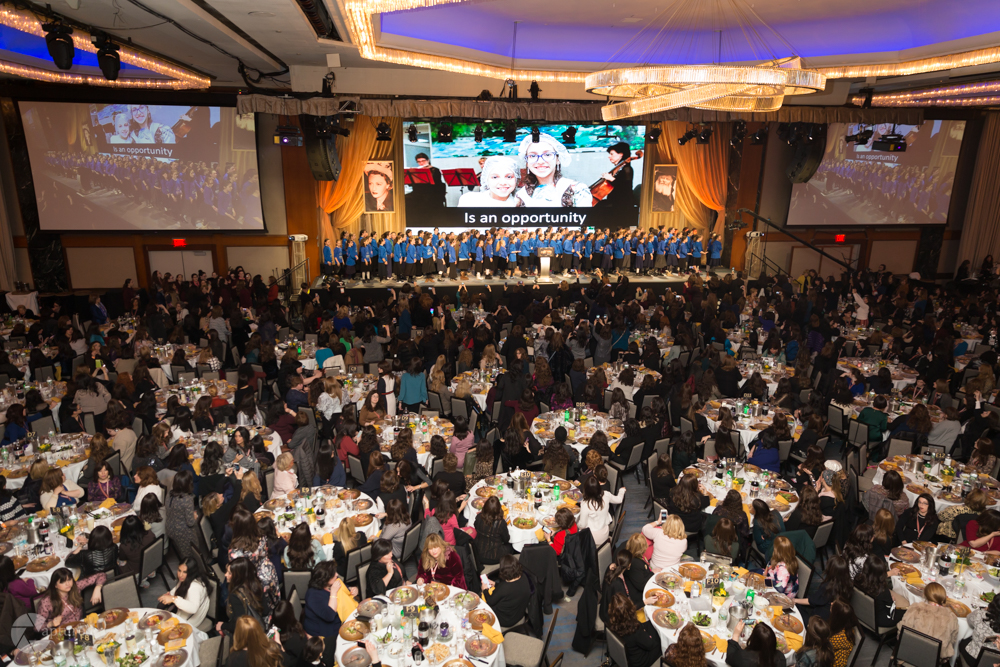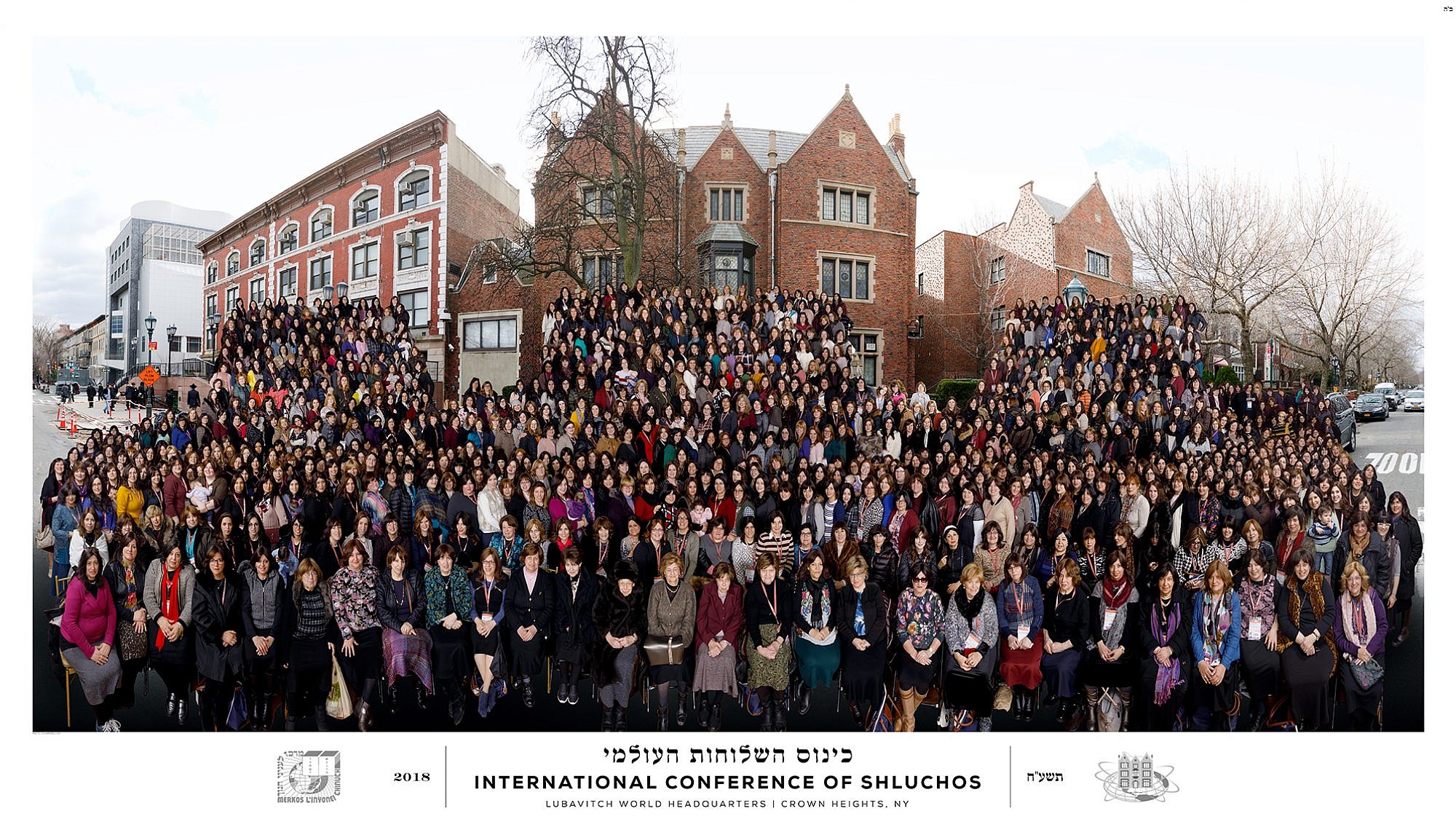For the more than 3,000 women who filled each table—every inch of the ballroom at the New York Hilton Midtown hotel—it came as no surprise that such significant news would be announced the same night they honored one of the most significant people in their lives: the Rebbetzin Chaya Mushka Schneerson.
At a gala banquet Sunday marking the 30th anniversary of her passing and the closing event of the annual conference of Chabad-Lubavitch Women Emissaries (Kinus Hashluchos), it was revealed that a young couple will soon be moving to Reykjavik to open Chabad of Iceland—meaning every major capital in Europe now has a Chabad center.
It’s another milestone in the far-reaching vision of the Lubavitcher Rebbe—the late Rabbi Menachem M. Schneerson (the Rebbe)—to see emissaries span the length and breadth of the globe, now in 100 countries, seeking to bring Jews closer to Judaism. Once they are deployed abroad and receive initial support from Chabad headquarters, the emissaries and their local centers of Jewish life do not receive additional funding from their parent organization, creating an entrepreneurial model that many observers say has driven the success of the Chabad movement.
The center in Iceland, headed by Rabbi Avi and Mushky Feldman, will be the country’s first institutional Jewish presence; Feldman will be the country’s first permanent rabbi; and aside from congregations formed by British and American troops during World War II, theirs will be the first synagogue in the country’s 1,000-plus years of history.
While perhaps 100 Jews have participated in community functions in one way or another, the year-round Jewish population, including university students and staff, is likely closer to 250. Along with the burgeoning tourist industry, which has exploded in the last decade and currently contributes to 10 percent of Iceland’s GDP, those numbers are likely to increase.
But with the steps forward for Chabad come some challenges—namely, the acknowledgment by Chana Rosenblum, of Hogar Jabad Lubavitch in Caracas, of the deteriorating political, economic and social conditions in Venezuela, and how many in that Jewish community have been leaving for other nations.
Under President Nicolas Maduro, Venezuela has seen triple-digit inflation and food shortages, with even middle-class families unable to afford basic necessities.
“It is difficult to watch a community you love disintegrate,” she said, thanking those emissaries who have welcomed Venezuelan Jews elsewhere and affirming Chabad of Venezuela’s commitment to the many who remain.
‘A very empowering time’
Nevertheless, Sunday’s overall theme was one of inspiration, centering on the ongoing role model the women emissaries have in Rebbetzin Chaya Mushka Schneerson.

“I wish I could have known her,” said Esther Kosofsky, 56, of Chabad of Longmeadow, Mass. “Yet since her passing, she has become more and more alive for me.”
“The Rebbe and the Rebbetzin worked part and parcel for their vision of the world. He was the public person out front; she was the strength behind him,” explained Kosofsky. “She gave us the Rebbe, but in the years since her passing, we’ve got her, too.”
In the 34 years Kosofsky has served as an emissary, she has attended the Kinus about 20 times. “I used to think that the Rebbe wanted us here just for the learning, and that everything else was a byproduct. But I’ve learned that inspiration comes in different ways. It comes on a bus ride or in conversation…there’s just this kinship that’s so strong,” she said.
“It’s a very empowering time,” agreed Mushkie Gurary, 23, co-director of Chabad of Lake Balboa in Van Nuys, Calif., who became an emissary last May.
Regarding the gala in particular, Gurary—one of the Rebbetzin’s many namesakes—stated, “It’s a day of strength for all the Mushkas.”
This kind of camaraderie is what brought Shachar Banin, co-director of Chabad of Venice, Italy, with her husband, Rabbi Ramy Banin, to the conference this year. (That, and the fact that her 12-year-old daughter wanted to go.) By attending, she is reminded—even after 28 years as an emissary—of the strong connection among these Jewish women.
“Even when you’re literally on an island,” which Venice is, she pointed out, “you’re not by yourself. It’s encouraging to know that you’re never alone.”
Chana Nisilevitch of Beth Habad Kehilat Chné-Or in Aubervilliers, France, just north of Paris, attended the Kinus Hashluchos for the first time this year. She admitted that with two children under 18-months-old and work piled up, she felt she couldn’t possibly go. So she approached her mashpia (spiritual mentor) for validation to stay back, and instead got the opposite response.
She was reminded that “the Rebbe wanted, insisted, that women come, even if it’s hard. You just come,” said the 27-year-old, who has been an emissary for four years. “And I’m really happy to be part of the group. It’s very special, this 30th year.”
‘Forging ahead’
Rabbi Moshe Kotlarsky, vice chairman of Merkos L’Inyonei Chinuch, the educational arm of the Chabad-Lubavitch movement, and Rabbi Yehuda Krinsky, chairman of Merkos L’Inyonei Chinuch, addressed the group as they do every year.
Kotlarsky, who announced the development of the new Chabad center in Iceland, spoke about the demands and responsibilities of women emissaries, and their constant emphasis on the drive to educate every person who walks into their homes. But while they work year-round to inspire others, the conference represents a time when they are invigorated as well.
Krinsky echoed that sentiment, saying he heard from many women during the four-day conference that they will return home recharged, refreshed and ready to go.
He went on to note that Chabad emissaries are “forging ahead on all fronts around the globe. With every passing week and month, new young couples are off to new destinations, and the Jewish world watches in awe with admiration and respect and gratitude.”
To that end, the gala’s annual roll call of emissaries was read aloud by four young women filling the role for the first time: Chani Silver (Curaçao), Sheera Bluming (Bahamas), Chani Edelkopf (Montenegro) and Mushky Feldman (Iceland). The roll call began with Chabad of Angola and ended with Chabad of Zanzibar.


























